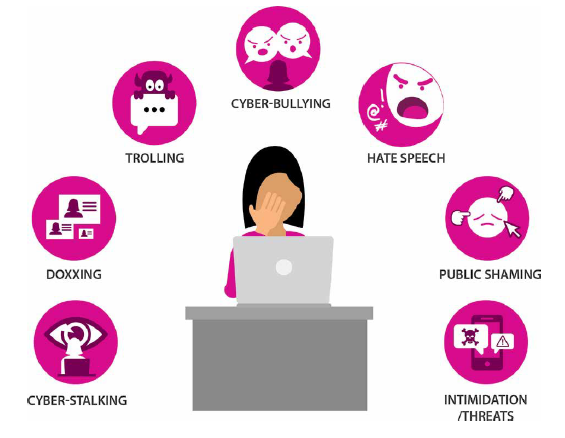Book Review by Rachel Dortin
Wayne State University
Defining and Illustrating Cybersexism
Poland explicitly stated that Haters was intended to initiate a difficult conversation—not provide finite answers. Using that premise, she defined cybersexism as, “the expression of prejudice, privilege, and power in online spaces and through technology as a medium” (p. 3) and continued, stating that the goals of abusers centered on, “creating, enforcing, and normalizing male dominance in online spaces—norms preferred by straight, cisgender white men, primarily located in the United States” (p. 4). The anonymity afforded by internet discourse fostered a sense of security for assailants. Poland elaborated on how men used the norms of internet forums to quiet and belittle women.

Poland described each level of cybersexist abuse, beginning with minor, solely digital attacks to those which violently extended into one’s personal, physical life. She used colloquial terms to establish her definitions, such as “mansplaining” and “trolling,” which made her message resonate more clearly with her audience. While the average reader would be familiar with many of her examples, she expanded on two extreme forms of cybersexism that were both physically dangerous and perhaps unknown to most readers: "doxxing” and “SWATting” (p. 54). Doxxing was defined as archiving a target’s personal information (i.e., address, social security number, bank information, place of work, etc.) and publicizing it for potential assailers. Often, doxxing can result in physical harassment and stalking in addition to the harassment experienced in the digital realm. SWATting was explained as an assailant making a fake 911 phone call describing a particularly heinous event (such as a gruesome rape or murder) and providing the target’s address as the locale, which would lead to a SWAT team forcefully entering the victim’s home. In most cases, the target was unaware of this emergency call. This form of harassment was emotionally damaging to the victim, and also wasted the resources, time, and money of local law enforcement and emergency services. Poland introduced the reader to often unfamiliar forms cybersexism to reinforce the necessity for further discourse surrounding cybersexism and its prevention.

